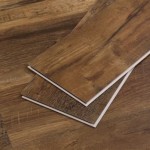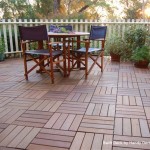Floating Laminate Flooring: A Comprehensive Guide
Floating laminate flooring represents a popular choice for residential and commercial spaces due to its affordability, durability, and ease of installation. Unlike traditional flooring options that require adhesives or nails for securement, floating floors are designed to interlock and rest atop an underlayment, 'floating' above the subfloor. This construction offers numerous advantages, but it's crucial to understand the nuances of floating laminate to make informed decisions regarding its suitability for specific applications.
Laminate flooring consists of several layers fused together under high pressure. The topmost layer is typically a transparent wear layer, providing resistance against scratches, stains, and fading. Beneath the wear layer lies a decorative layer, often a high-resolution photograph replicating the appearance of wood, stone, or tile. The core layer, typically made of high-density fiberboard (HDF) or medium-density fiberboard (MDF), provides the structural integrity of the plank. Finally, a backing layer stabilizes the plank and provides moisture resistance from below.
The term "floating" refers to the installation method, not the material composition itself. Laminate flooring utilizes a tongue-and-groove locking system that allows planks to connect seamlessly, forming a continuous surface that isn't directly attached to the subfloor. This installation method simplifies the process, reducing installation time and cost compared to traditional hardwood or tile installations.
Understanding the Advantages of Floating Laminate
Floating laminate flooring offers a compelling combination of benefits, making it a desirable option for various projects. These advantages extend beyond aesthetics and encompass practical considerations regarding installation, maintenance, and long-term performance.
One of the primary advantages is its cost-effectiveness. Laminate flooring typically costs less than hardwood, tile, or stone, both in terms of material costs and installation expenses. The simplified installation process minimizes labor costs, making it an attractive option for budget-conscious homeowners and businesses.
Another significant advantage is the ease of installation. The tongue-and-groove locking system simplifies the installation process, enabling even novice DIY enthusiasts to install laminate flooring with relative ease. Detailed instructions and readily available online resources further contribute to the user-friendly installation process. No specialized tools or extensive expertise are required, unlike with nail-down or glue-down installations.
Furthermore, floating laminate flooring is known for its durability and resistance to wear and tear. The wear layer protects the decorative layer from scratches, stains, and fading, extending the lifespan of the flooring. Laminate flooring is also resistant to impact damage, making it suitable for high-traffic areas and households with children and pets. However, the durability depends on the quality and thickness of the wear layer; thicker wear layers offer greater protection.
Maintenance of floating laminate flooring is comparatively straightforward. Regular sweeping or vacuuming removes dust and debris, while occasional damp mopping with a manufacturer-approved cleaning solution keeps the floor looking its best. Unlike hardwood flooring, laminate does not require waxing or polishing. Avoiding excessive water exposure is important to prevent damage to the core layer.
Finally, floating laminate flooring offers design versatility. The decorative layer can replicate a wide range of materials, including various wood species, stone patterns, and tile designs. This versatility allows homeowners and businesses to achieve the desired aesthetic without incurring the cost and maintenance associated with natural materials. The availability of different plank sizes, textures, and finishes further enhances the design possibilities.
Addressing Potential Drawbacks and Considerations
While floating laminate flooring offers numerous advantages, it's essential to acknowledge potential drawbacks and considerations before making a purchase. Understanding these limitations enables informed decision-making and helps prevent dissatisfaction with the final result.
One potential drawback is its susceptibility to moisture damage. While the backing layer provides some moisture resistance, excessive exposure to water can cause the core layer to swell and warp. This is particularly problematic in areas prone to spills or high humidity, such as bathrooms and kitchens. Selecting a water-resistant or waterproof laminate option is crucial for these applications. Proper sealing of edges and seams can also mitigate moisture damage.
Another consideration is the feel underfoot. Laminate flooring can feel harder and colder than hardwood or carpet. However, the use of a quality underlayment can mitigate this issue by providing cushioning and insulation. Underlayment also helps to reduce noise transmission, making it a valuable addition for upper-level floors.
Sound transmission can also be a concern with floating laminate flooring. Walking on laminate can generate a hollow sound, especially in rooms without adequate sound insulation. Installing a sound-dampening underlayment can significantly reduce noise levels and improve overall acoustic comfort.
Repairing damaged laminate flooring can be more challenging than repairing hardwood. While minor scratches can sometimes be masked with repair kits, significant damage may require plank replacement. Matching the replacement plank to the existing flooring can be difficult, especially if the original flooring is discontinued. Keeping extra planks from the original installation can alleviate this problem.
The resale value impact of laminate flooring compared to hardwood is another consideration. While laminate can enhance the aesthetic appeal of a home, it may not increase resale value to the same extent as hardwood floors. However, its affordability and durability can still make it an attractive option for homeowners seeking a cost-effective flooring solution.
Key Considerations for Installation and Maintenance
Proper installation and maintenance are crucial for maximizing the lifespan and performance of floating laminate flooring. Adhering to manufacturer recommendations and implementing appropriate maintenance practices can prevent premature wear and tear and ensure long-term satisfaction.
Subfloor preparation is paramount for a successful installation. The subfloor must be clean, level, and dry. Any imperfections, such as cracks or unevenness, should be addressed before installing the underlayment and laminate flooring. Uneven subfloors can cause the laminate planks to flex and potentially separate at the seams. Self-leveling compounds can be used to create a smooth and even subfloor.
Selecting the appropriate underlayment is equally important. The underlayment provides cushioning, insulation, and sound dampening, enhancing the overall performance and comfort of the flooring. Different types of underlayment are available, each offering varying levels of performance and features. Consider the specific needs of the space when selecting an underlayment, such as moisture resistance and sound absorption.
When installing the laminate flooring, follow the manufacturer's instructions carefully. Ensure that the planks are properly aligned and locked together. Use spacers along the walls to maintain an expansion gap, allowing the flooring to expand and contract with changes in temperature and humidity. Proper expansion gaps prevent buckling or warping of the flooring.
Regular cleaning and maintenance are essential for preserving the appearance and longevity of laminate flooring. Sweep or vacuum the floor regularly to remove dust and debris. Use a damp mop with a manufacturer-approved cleaning solution to clean the floor. Avoid using excessive water or harsh chemicals, as these can damage the laminate's surface. Wipe up spills promptly to prevent staining or water damage.
Protect laminate flooring from heavy furniture by using furniture pads or coasters. Avoid dragging heavy objects across the floor, as this can cause scratches. Consider using rugs in high-traffic areas to further protect the flooring from wear and tear. By following these guidelines, homeowners and businesses can ensure that their floating laminate flooring remains beautiful and functional for years to come.

What Is A Floating Floor Flooring America

What Is A Floating Floor Pros And Cons Esb Flooring

What Is A Floating Floor Flooring America

What Is A Floating Floor Pros And Cons 50floor

What Is A Floating Floor Flooring America

Floating Floors Vs Non What Gives

Advantages Disadvantages Of Floating Floors Floorings

What Is A Floating Floor The Basics Floorings

What Is Floating Flooring Ultimate Guide To Floors Floorvenue

How To Install Floating Laminate Flooring
Related Posts








